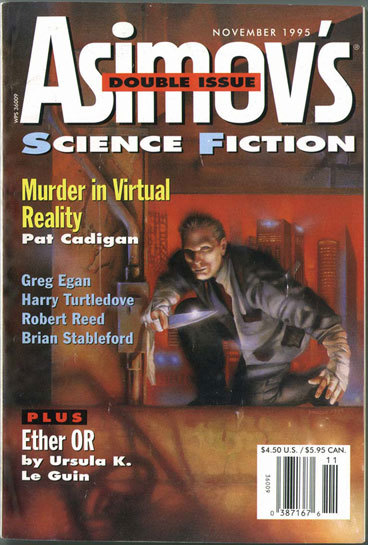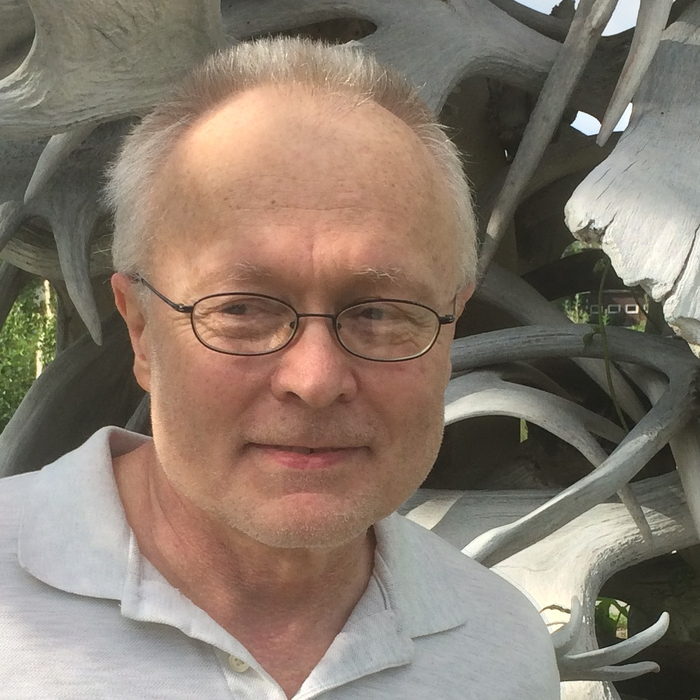
CONTENTS Novellas "We Were Out of Our Minds with Joy" by David Marusek "Romance in Lunar G" by Tom Purdom Novelettes "Ether OR" by Ursula K. Le Guin "TAP" by Greg Egan "Aeon's Child" by Robert Reed "Must and Shall" by Harry Turtledove "Death in the Promised Land" by Pat Cadigan Short Stories "No Love in All of Dwingeloo" by Tony Daniel "The Skin Trade" by Brian Stableford Poetry "At the Pet Shop" by Keith Allen Daniels "In Kafkaville the Funerals Run on Time" by William John Watkins Departments "Reflections: The Power of Words" by Robert Silverberg "Letters" "On Books" by Peter Heck "SF Conventional Calendar" by Erwin S. Strauss Asimov's Science Fiction, November 1995, Vol. 19, Nos. 12-13 (Whole Nos. 237-238) Gardner R. Dozois, editor Cover art by Bruce Jensen
Authors

Ursula K. Le Guin published twenty-two novels, eleven volumes of short stories, four collections of essays, twelve books for children, six volumes of poetry and four of translation, and has received many awards: Hugo, Nebula, National Book Award, PEN-Malamud, etc. Her recent publications include the novel Lavinia, an essay collection, Cheek by Jowl, and The Wild Girls. She lived in Portland, Oregon. She was known for her treatment of gender (The Left Hand of Darkness, The Matter of Seggri), political systems (The Telling, The Dispossessed) and difference/otherness in any other form. Her interest in non-Western philosophies was reflected in works such as "Solitude" and The Telling but even more interesting are her imagined societies, often mixing traits extracted from her profound knowledge of anthropology acquired from growing up with her father, the famous anthropologist, Alfred Kroeber. The Hainish Cycle reflects the anthropologist's experience of immersing themselves in new strange cultures since most of their main characters and narrators (Le Guin favoured the first-person narration) are envoys from a humanitarian organization, the Ekumen, sent to investigate or ally themselves with the people of a different world and learn their ways.

Greg Egan specialises in hard science fiction stories with mathematical and quantum ontology themes, including the nature of consciousness. Other themes include genetics, simulated reality, posthumanism, mind transfer, sexuality, artificial intelligence, and the superiority of rational naturalism over religion. He is a Hugo Award winner (and has been shortlisted for the Hugos three other times), and has also won the John W Campbell Memorial Award for Best Novel. Some of his earlier short stories feature strong elements of supernatural horror, while due to his more popular science fiction he is known within the genre for his tendency to deal with complex and highly technical material (including inventive new physics and epistemology) in an unapologetically thorough manner. Egan is a famously reclusive author when it comes to public appearances, he doesn't attend science fiction conventions, doesn't sign books and there are no photos available of him on the web. Excerpted from Wikipedia.



Dr Harry Norman Turtledove is an American novelist, who has produced a sizeable number of works in several genres including alternate history, historical fiction, fantasy and science fiction. Harry Turtledove attended UCLA, where he received a Ph.D. in Byzantine history in 1977. Turtledove has been dubbed "The Master of Alternate History". Within this genre he is known both for creating original scenarios: such as survival of the Byzantine Empire; an alien invasion in the middle of the World War II; and for giving a fresh and original treatment to themes previously dealt with by other authors, such as the victory of the South in the American Civil War; and of Nazi Germany in the Second World War. His novels have been credited with bringing alternate history into the mainstream. His style of alternate history has a strong military theme.
Tony Daniel is an author of science fiction novels, short stories, and radio dramas. For the comic book author, see Tony S. Daniel.


Pat Cadigan is an American-born science fiction author, who broke through as a major writer as part of the cyberpunk movement. Her early novels and stories all shared a common theme, exploring the relationship between the human mind and technology. Her first novel, Mindplayers, introduced what became a common theme to all her works. Her stories blurred the line between reality and perception by making the human mind a real and explorable place. Her second novel, Synners, expanded upon the same theme, and featured a future where direct access to the mind via technology was in fact possible. She has won a number of awards, including the prestigious Arthur C. Clarke Award twice,in 1992, and 1995 for her novels Synners and Fools. She currently lives in London, England with her family.